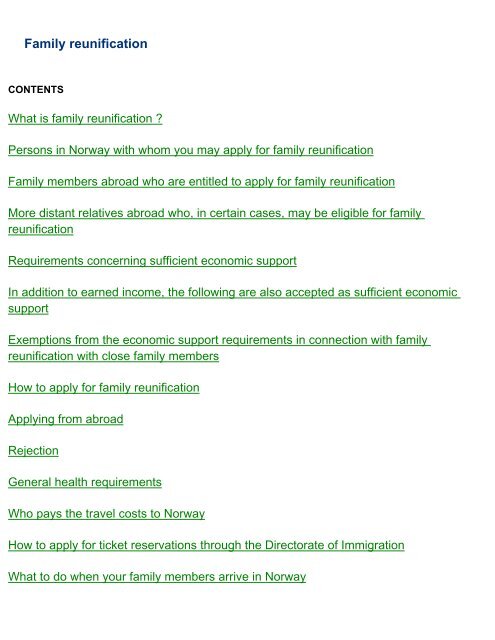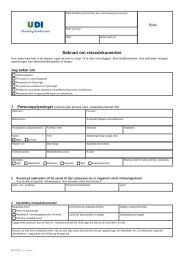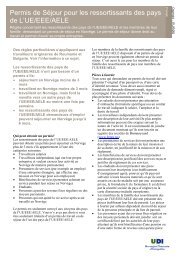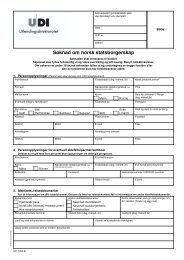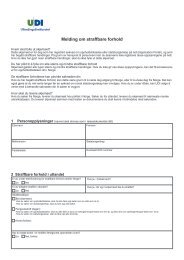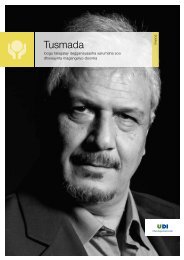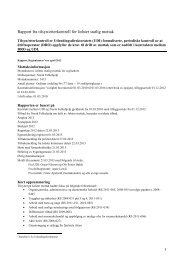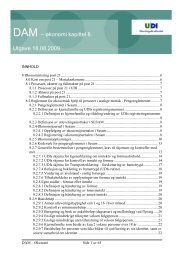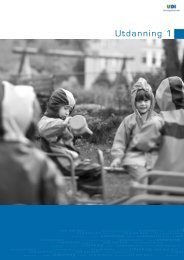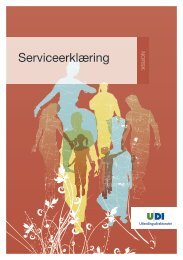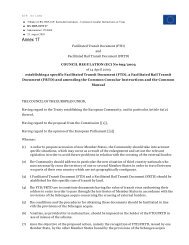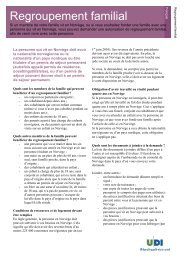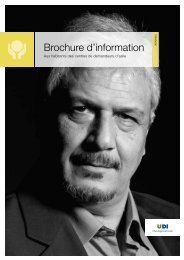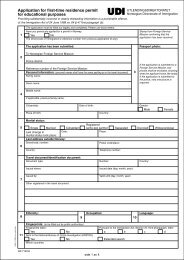Family reunification - UDI
Family reunification - UDI
Family reunification - UDI
You also want an ePaper? Increase the reach of your titles
YUMPU automatically turns print PDFs into web optimized ePapers that Google loves.
●time e.g. for two years.Be a foreign national with a residence permit for the purpose of education in Norway.* A settlement permit grants the holder the right to live and work in Norway on a permanent basis. Pleasecheck your passport to see what kind of permit you have. Applications for settlement permits must besubmitted to the police.**This means that you have been granted asylum, or that you have received a residence permit onhumanitarian grounds, or that you are a resettlement refugee or, for example, that you have been granteda work permit on the basis of specialist qualifications.Requirements concerning sufficient economic support must usually be satisfied.<strong>Family</strong> members abroad who are entitled to apply for family <strong>reunification</strong>The general rule is that an application for family <strong>reunification</strong> should be submitted by the person livingabroad who wishes to come to Norway. The following persons my apply for family <strong>reunification</strong> with you ifyou live in Norway:●●●●●●●●Your spouse, who must be over the age of 18. You may only bring one spouse with you.Your cohabitant. You must both be over the age of 18, and have lived together for at least twoyears. Neither of you may be married to another person, and you must intend to continue livingtogether.You and your spouse/cohabitant's unmarried children under the age of 18. A condition is that bothparents must already have been granted or will shortly be granted lawful residence in Norway.Your own children under the age of 18. Your children may be allowed to join you even if you livealone in Norway. You must have had the actual care of the child/children. Taking the best interestsof the child into consideration must not weigh against the child being allowed entry into Norway. Achild over 12 years of age has the right to express his or her opinion in the case.Children under the age of 18 whom you are going to adopt ( Act No. 8 of February 1986 relating toadoption, or pursuant to the laws of another country). Both adoptive parents must be resident inNorway. You must obtain the consent of the Government Adoption Office before the child will beallowed into Norway.You and your spouse/cohabitant's children under the age of 21 who are not married or cohabitant.A condition is that both parents must already have been granted or will shortly be granted lawfulresidence in Norway. Furthermore, you must have the actual care of the child, and you must be anational of a country which has signed the European Social Charter of 18 October 1961. Inpractice, this applies to most Western European countries.Your single mother or father and siblings under 18 years of age who are not married or cohabitant.The siblings must live together with the parents. Persons living abroad who apply for <strong>reunification</strong>must live together with you who are already living in Norway. The parent in the country of originwho had parental responsibility and the actual care for you will be given priority with <strong>reunification</strong>.Your foreign national mother or father and you are a Norwegian national. Your mother or fathermust have parental responsibility and the actual care for you. Your mother or father must not be
●married or cohabitant with a foreign national when he/she enters Norway.Your foreign national mother or father and you are living in Norway together with the other of theparents who has parental responsibility and the day-to-day care for you. The foreign nationalapplicant must be able to document right of access to you.If you are under the age of 18, have been granted asylum in Norway or are a resettlement refugee, youare entitled to family <strong>reunification</strong> with your parents and any of your unmarried brothers and sisters underthe age of 18 who live with your parents.More distant relatives abroad who, in certain cases, may be eligible for family<strong>reunification</strong>The person/persons in Norway with whom family <strong>reunification</strong> is being sought must satisfy one of thefollowing conditions:●●●Be a Norwegian or Nordic national.Be a foreign national with a settlement permitBe a foreign national with a work permit or residence permit which may constitute the grounds for asettlement permit.If you live in Norway and satisfy one of the conditions above, you may be entitled to family <strong>reunification</strong>with the persons mentioned below, but you should note that family <strong>reunification</strong> is never an automatic right.In all these cases, the authorities require guarantees regarding not only sufficient economic support,but also adequate housing. This means that the person who lives in Norway must have the use of house,flat, bedsitter or equivalent. If the person concerned is renting accommodation, s/he must submit a writtenlease, signed by the landlord, housing cooperative or other party in charge of the accommodation where s/he is living.The main rule is that an application for family <strong>reunification</strong> should be submitted by the persons who liveabroad and who wish to come to Norway.The following people may apply for family <strong>reunification</strong> with you if you live in Norway:●Your cohabitant.The following conditions must be satisfied:- both you and your cohabitant must be over 18 years of age- you intend to continue living together- you are expecting a child together
or:- both you and your cohabitant must be over 18 years of age- you are to be married after you have been reunited in Norway- there are no reasons preventing you from being marriedor:- both you and your cohabitant must be over 18 years of age- you are usually required to have already lived together for at least two years- you intend to continue living together- there are permanent reasons preventing you from marrying, e.g. because one of you is alreadymarried●Your single, elderly mother or father who has no other relatives in his/her native countries.In certain cases, <strong>reunification</strong> with both parents may be granted, provided that you have particularresponsibility for them and that there is no other person taking care of them in their native country.Your parents may also be permitted to visit your family in Norway for up to six months, provided thatthey return to their native country at the end of this period.● Your own unmarried child over the age of 18, whom you are personally supporting, provided that s/he has no other person to take care of him/her in the native country.This also applies if the child suffers from a particular illness causing him/her to be completelydependent on parental care.●Your foster child under the age of 18, provided that the child is an established member of the family.You must submit documentation confirming that parental responsibility has been transferred to you.Your home must be approved by the Norwegian child welfare authorities either before the childarrives in Norway or immediately after s/he has arrived.<strong>Family</strong> <strong>reunification</strong> may sometimes be granted in certain special circumstances in addition to thosementioned above. Such exceptions are only made when significant humanitarian considerations arepresent.
Requirements concerning sufficient economic supportIn general, persons entering Norway to be reunited with their family must be guaranteed sufficienteconomic support. In practice, this means either that the person living in Norway must have permanentemployment, or that the person coming to Norway has been offered employment and that their totalincome together will be sufficient so support them both.In addition to earned income, the following are also accepted as sufficient economicsupport●●Certain National Insurance benefits, provided that they are sufficient.A student loan and income from any part-time employment ( up to 20 hours per week)Benefits received in accordance with the Act relating to social welfare (social welfare benefits) are notconsidered to provide sufficient economic support.Exemptions from the economic support requirements in connection with family<strong>reunification</strong> with close family membersCertain exemptions from the requirements of sufficient economic support apply in the case of family<strong>reunification</strong> with your closest family members if the following conditions are satisfied:●●●●●●When the applicant abroad is the spouse, cohabitant or child under 18 years of age of a personwho has been granted asylum, or pursuant to an application for asylum has been grantedresidence on humanitarian grounds in Norway, or is a resettlement refugee. The marriage musthave taken place before the person in Norway entered the country.When the applicant abroad is a parent or sibling of the person in Norway, and is unmarried anddoes not have a cohabitant. The person in Norway must be under 18 years of age and must havebeen granted asylum, or pursuant to an application for asylum must have been granted residenceon humanitarian grounds, or must be a resettlement refugee.When the applicant abroad is the mother or the father of a Norwegian child who she/he has theparental responsibility and day-to-day care for.When the applicant abroad is the mother or the father of a child who has residence in Norway. Thechild must live together with the other parent who has the parental responsibility and day-to-daycare of the child. The applicant abroad must have the right of access to the child.When the applicant abroad is the spouse or cohabitant of a Nordic national who has been residentin Norway for the last three years, or is a child under 18 years of age of the person concerned. Themarriage or cohabitation must have lasted at least three years.When the applicant abroad is the spouse, cohabitant or child under 18 years of age of a person inNorway who has a settlement permit. The marriage or cohabitant must have lasted at least three
years.An applicant who is married to a Norwegian national resident in Norway will, as a rule, be granted family<strong>reunification</strong> even if the requirements concerning economic support are not satisfied.How to apply for family <strong>reunification</strong>In general, an application for family <strong>reunification</strong> should be submitted from abroad. The applications will becomputer registered and applicants have the right of access to the information stored about them. Incertain special cases an application may be submitted from Norway. Certain applicants who do not need avisa, for example, a spouse of a Norwegian/Nordic national, or a foreign national with a settlement permit,may apply for family <strong>reunification</strong> from Norway. Further information is available from the police or from aNorwegian Foreign Service mission.Applying from abroad<strong>Family</strong> members living abroad must contact a Norwegian foreign service mission (embassy or consulate)and apply for a residence permit. This application also serves as a visa application if the applicant needs avisa for entering Norway. The following documents and photographs are required: marriage certificate,birth certificate, school certificates, and divorce documents or death certificates, if any. Two passport-sizephotographs must also be enclosed with the application.The application is then sent to the Directorate of Immigration (<strong>UDI</strong>) which contacts the police authorities inthe district where the person in Norway requesting family <strong>reunification</strong> is living. The local police authoritiesthen obtain information from this person concerning the family situation and ability to provide economicsupport, i.e. the person's income.The Directorate of Immigration makes the final decision as to whether the family member(s) will beallowed to come to Norway. Both the person in Norway and family member(s) abroad will be notified of thedecision. Please note that the person abroad must not come to Norway until permission to do sohas been granted.RejectionIf an applicant for family <strong>reunification</strong> is rejected, the decision may be appealed to the Ministry of Justice.The appeal should be sent to the foreign service mission which forwards it to the authorities in Norway.General health requirementsPursuant to Section 51, paragraph 4 of the Immigration Regulations, foreign nationals who are going to
eside in the country for more than three months must be made aware of the duty to undergo anexamination for tuberculosis.The tuberculosis examination is free and must be taken as soon as possible after arrival in Norway.The police shall give the health authority concerned notification of the name and address of any foreignnational who is to reside in the realm for more than three months. This especially applies to personscoming from countries which have a high prevalence of tuberculosis.Who pays the travel costs to NorwayIf you are a resettlement refugee, or have been granted asylum in Norway, the Norwegian State will covertravel costs for your family once you have been granted the right to family <strong>reunification</strong>. If you have beengranted residence on humanitarian grounds, travel costs for your family will be covered if you have appliedfor family <strong>reunification</strong> within <strong>reunification</strong> within five years after you were granted a residence permit. Thisprogramme is restricted to persons with little or no income.The Integration Department at the Directorate of Immigration makes the travel arrangements inconjunction with the International Organization for Migration (IOM).The Integration Department at the Directorate of Immigration is responsible for contacting the person(s)abroad and for making ticket reservations through the IOM.You can contact the refugee officer in your local municipality to apply for ticket reservations, or you cancontact the Directorate of Immigration directly.If you make travel reservations yourself, you cannot expect to have the cost refunded, even if your familyis entitled to have their travel costs covered.How to apply for ticket reservations through the Directorate of ImmigrationWhen applying for ticket reservations, you must provide the following information:●Information regarding the person(s) who are coming to Norway:- Fremkon number (given on the letter notifying you that family <strong>reunification</strong> has been granted)- Name, date of birth and sex
- Address and telephone number in the country where they are staying- Place of departure, i.e. country and city from which the person(s) will be travelling- Preferred date of departure●Information regarding the person resident in Norway:- Name, date of birth, address and family relationship to the person(s) with whom family<strong>reunification</strong> has been granted- Home municipality- Closest airportWhat to do when your family members arrive in NorwayWhen your family arrives in Norway, you are responsible for notifying the following authorities:●●●●The immigration authorities - the local police in the municipality where you liveThe population register in the municipality where you liveThe health authorities - municipal medical officer, public health nurse; cf. the duty to undergo atuberculosis examinationThe school authorities - the municipal education officePlease contact your local refugee/immigrant office if you need advice or counselling services in connectionwith family <strong>reunification</strong>.Additional informationThe Norwegian Directorate of ImmigrationP.O.Box 8108 Dep.N-0032 OsloTel 23 35 15 00Other agencies offering advice and counselling in connection with family <strong>reunification</strong>:
Juss-Buss(Law Students'Legal Information ServiceSt. Olavsgt. 29N-0166 OsloTel 22 85 18 50Kontoret for fri rettshjelp(Office for Free Legal Aid)P.O.Box 8809 YoungstorgetN-0028 OsloTel. 22 42 52 60Juridisk Rådgivning forKvinner (JURK)(Legal Advice for Women)P.O.Box 6756 St. Olavs plassN-0130Tel. 22 85 19 00Free legal aid programmePersons with income below a predetermined level may apply to the country governor (fylkesmannen) for frilegal aid. If you contact a lawyer or the county governor directly, you can have your situation assessed toascertain whether you are entitled to free legal aid.Published by:UtlendingsdirektoratetPpostboks 8108 dep.N-0032 OsloTel 23 35 15 00This pamphelt is available in the followiong languages: Engllish, French, Norwegian, Serbo-Croatian and Somali. This brochure has been revised in November 1997.


